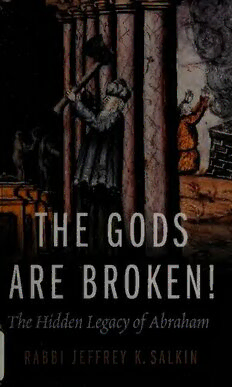
The Gods Are Broken!: The Hidden Legacy of Abraham PDF
Preview The Gods Are Broken!: The Hidden Legacy of Abraham
THE GODS ARE BROKEN! University of Nebraska Press • Lincoln The Gods Are Broken! The Hidden Legacy of Abraham RABBI JEFFREY K. SALKIN The Jewish Publication Society • Philadelphia © 2013 by Jeffrey K. Salkin. All rights reserved. Published by the University of Nebraska Press as a Jewish Publication Society book. Manufactured in the United States of America. ® Library of Congress Cataloging-in-Publication Data Salkin, Jeffrey K., 1954- The Gods are broken!: the hidden legacy of Abraham / Jeffrey K. Salkin. pages cm. Includes bibliographical references. isbn 978-0-8276-0931-0 (pbk.: alk. paper) 1. Idols and images—Worship—Biblical teaching. 2. Iconoclasm. 3. Monotheism—Biblical teach¬ ing. 4. Abraham (Biblical patriarch) 5. Midrash rabbah. Genesis—Criticism, interpretation, etc. 6. Bible. O.T. Genesis—Criticism, interpretation, etc. 7. Antisemitism. I. Title. BS1199.134S25 2013 296.4'9—dc23 2012042380 Set in Lyon Text by Laura Wellington. Designed by A. Shahan. Contents Introduction vii 1 Out of Ur 1 2 Abraham the Iconoclast 17 3 Which Gods Shall We Break Today? 33 4 Three Paths to the Sacred 49 5 The Primal Trauma of the Jewish People 65 6 (Re) Embracing Terah 81 7 From Broken Idols to Broken Tablets 101 8 The Sound of Broken Glass: Jewish Iconoclasm and Anti-Semitism 115 Notes 135 Bibliography 149 Introduction A few years ago, I had a long cup of coffee with a Jewish man who was in his eighties. He was telling me about his life—about his loves, his losses, his successes and regrets. At a certain point in the conversation, he told me about the few unhappy years of his Jew¬ ish education. Those experiences had occurred in a heder (Hebrew school) that was located in a synagogue ba sement in Brooklyn—a synagogue which had, long ago, lost all of its members and had turned into a bodega. His Jewish education had been brief, joyless, and, judging from his avowed secularity, not too successful. His stories were sadly typical of Jewish education in the 1930s and 1940s: bad teachers, bad textbooks, and great spitball fights. “It couldn’t have been all bad,” I suggested. “Is there any lesson, in particular, that you remember?” Without a moment of hesitation, he responded: “Of course. I remember the first sentence we learned how to recite in Hebrew.” “What was it?” I asked. He closed his eyes, and he reached back in his mind to a memory that was more than seventy years old: “Avraham lo he’emin ba- p’silim” (Abraham did not believe in the idols). That was, essentially, all that he remembered from his Jewish education. No other texts, no other stories, no other prayers. He’s not alone. Ask any Jew to tell you a Jewish story that he or she learned as a child, and that story will pop up. There’s almost a statistical cer¬ tainty to it. Most Jews can probably recite the story from memory. It would go something like this: vii Abraham’s father, Terah, was an idol-maker and merchant in Ur.1 Terah went away on a journey, and he left Abraham in charge of the store. Abraham took a stick and shattered all the idols in the store, and then he placed the stick in the hand of the largest idol. When Terah returned from his journey, he found his merchan¬ dise in pieces on the floor. “What happened?” he demanded to know. “Oh, father, it was terrible,” Abraham said. “The small idols got hungry and they started fighting for food, and finally the large idol got angry and he broke them into little pieces.” “Idols don’t get hungry, said Terah. “They don’t get angry, they don’t speak—they’re just idols.” Upon hearing this, Abraham smiled and said: “Oh, father, if only your ears could hear what your mouth is saying. Why, then, do you worship them?” With that, Abraham broke with idolatry, and in our way of telling the story, that’s how both monotheism and Jewish history began. Let’s understand, right from the beginning, that this was not really when monotheism started. As religious historians are quick to point out, it took the ancient Israelites approximately a thousand years to journey from their shadowy pagan roots to henotheism (the belief that “my” God is the best god among many possible gods) and ultimately to monotheism. Let’s also understand that the “Abraham breaking idols” story is actually a distortion of ancient paganism. In the ancient Near East, pagans didn’t pray to idols, though they did deify the forces of nature. The idols that existed were, most likely, merely visual representations of the gods, just as icons have historically func¬ tioned in certain Eastern Orthodox Christian traditions. But historical truth and anthropological accuracy doesn’t really matter. Stories have their own kind of power. Because we should also admit, that when Abraham shattered the idols, the shattering never stopped. It has continued to reverberate down through the ages. viii INTRODUCTION
